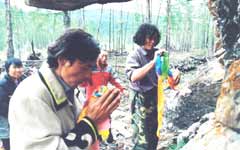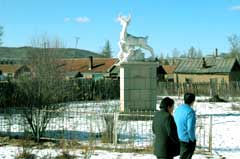| |
|
Deutsche Presse-Agentur |
|
August 24, 2003, Sunday |
|
Beijing |
|

|
| |
|
The last
ritual ceremony of the Ewenks |
|
|
before they are
forced to leave |
|

|
Ewenk tradition is
becoming legend
|
|
Arongbu worries about how his reindeer will cope with their new
environment, after moving 300 kilometres from their grazing land
in a primaeval forest in northeastern China.
In mid-August, Arongbu and other members of his Yakut tribe left
their homes in the Daxing Anling ( Ih-Hingaan Davaa ---- editor
) mountains, close to Mongolia and Siberia, for the comforts of
a purpose-built village.
The Yakuts, part of the Ewenki ethnic group, are the last ethnic
group that China still recognises as hunters. In their new
village, they will no longer be allowed to hunt. Their reindeer
will have to live in sheds or enclosures.
"The living conditions are better than those in the mountains,
but my reindeer were hungry for two days," Arongbu told the
Beijing Youth Daily shortly after he moved to New Aoxiang
village.
He was one the first wave of 37 people to move, among 169
members of Yakut families who are scheduled to leave the forest
by the end of this year. But many of those still living in old
Aoxiang or the surrounding forest are reluctant to give up their
traditional way of life.
The local government says it is moving the Yakuts, under what it
calls an "ecological migration", to protect the forest and its
wildlife. Li Zhixin, a spokesman for the city government in
Genhe, which administers Aoxiang, says there are several reasons
for the move.
Despite the small number of Yakuts living in the forest, their
800 reindeer have severely depleted the wild mosses and
mushrooms that grow on the forest floor, Liu told Deutsche
Presse-Agentur DPA by telephone.
"Although it (the grazing) cannot be a big threat to the forest,
gradually there will be major damage," he said. Liu said Aoxiang
village lies inside a nature reserve, in a flood-prone area near
the confluence of two rivers, and that the move will also to
help develop the Yakuts' economy. "Its politics, economy and
culture are more backward than other towns," he said of Aoxiang.
The Yakuts moved to Aoxiang in 1965, when tension between China
and the former Soviet Union forced their evacuation from an area
near the Argun river on the Sino-Russian border. They had lived
along the Argun since the early 18th century, following gradual
migration southeast from the Lake Baikal area of Siberia.
Yet their current migration has arguably the greatest symbolic
importance, as it may change the Yakuts' way of life forever.
"The actual distance is not great but the psychological distance
is more than 300 kilometres," Beijing Youth Daily reported from
Aoxiang.
Some strongly oppose the move to New Aoxiang, though Liu said
most of the Yakuts had approved the government's relocation
plan. "It is true that some old people were very reluctant, but
the government tried its best to persuade them to move," he
said. All of the first 11 families eventually agreed to move, he
said.
Media reports that some of the first 37 people had returned were
untrue, the secretary of the Aoxiang branch of China's ruling
Communist Party said.
The migrants must give up their hunting guns before they leave.
Hunters will lose an annual income of about 1,000 yuan (120
dollars), which supplements an average of at least 4,000 yuan
(480 dollars) per year earned from selling antlers and other
reindeer products. But they will continue to keep reindeer, and
officials will build a processing plant in New Aoxiang and a
"minority village" for tourists, Liu said.
China has some 26,000 Ewenkis, most of them living in its Inner
Mongolia region. Many already live in the region's towns and
cities, where it is not always easy to adapt to modern Chinese
life.
Liuba was the first Yakut from Aoxiang to attend college,
enrolling at the fine arts academy in the regional capital,
Hohhot, in 1981. She graduated and found a job with a fine arts
press in the city, but she was unable to adjust to urban life
and later returned to Aoxiang, Beijing Youth Daily said.
Back in her home village, Liuba became a heavy drinker. She
drowned last year while she was drunk. "Sudden change is
forceful and uncivilised," an unnamed Chinese expert who lived
with the Yakuts told the newspaper. "It's cruel to the people."
Liuba's sad story may sound familiar to people in other areas of
the world who are trying to cope with the leap from tribal to
modern culture. China's Communist Party sees the Ewenki hunters,
like Tibetans, Mongolians and other minorities who inhabit
remote areas of the country, as members of backward cultures in
need of economic development.
The Yakuts have a "backward mode of production and living
standards", the party secretary said by telephone form Aoxiang.
"Most of them are happy to move, especially when they consider
the fate of the next generation."
Yakut community leader Dawana saw education as the key to
avoiding more tragedies like Liuba's. She asked the local
government to help them move out of the forest. But even
younger, educated Yakuts are unsure if the move will really
benefit them.
Following in the footsteps of Liuba, Niurika started college two
years ago. The 20-year-old returns to her grandmother's home in
Aoxiang each vacation, taking photographs to document a way of
life that may soon be lost.
"I hope someday they will help outsiders to understand the
culture of the Ewenki hunters," Beijing Youth Daily quoted
Niurika as saying of her pictures.
Niurika has benefited from the Chinese education system but she
still has grave doubts about the move to New Aoxiang. "We can no
longer sit on the ground as we wish, we can no longer make
bonfires as we are used to; the reindeer no longer walk easily
around us," she said. "Perhaps we will have televisions or
telephones. So what?"
|





